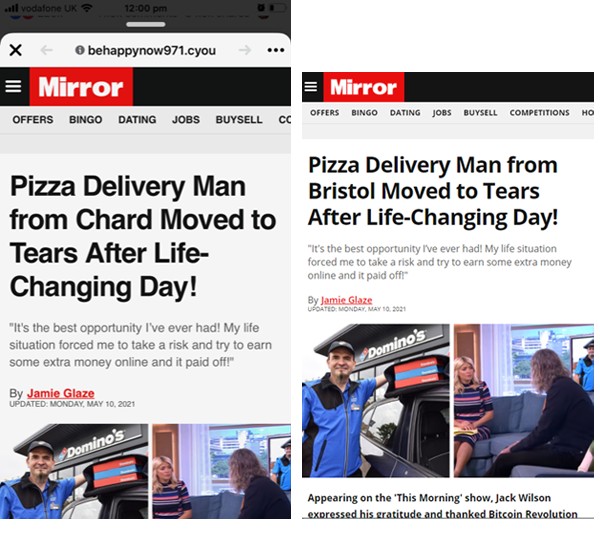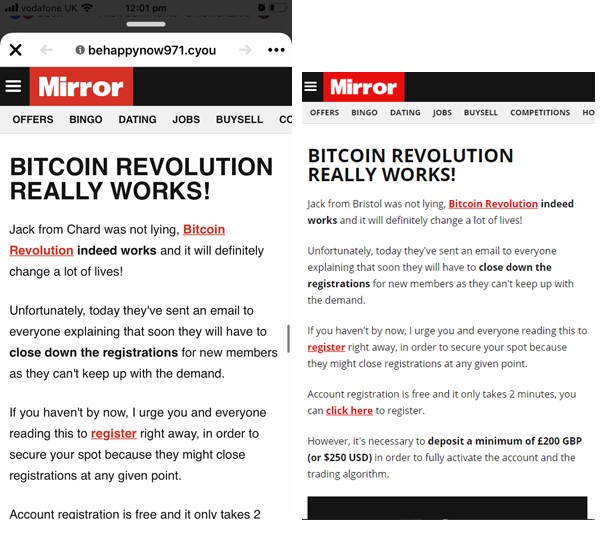Browsing Facebook earlier, I saw someone from my home town share what sounded like a heart warming story about a local guy. I clicked through, and found – I believe – lots of clues to show it was very damaging fake news.
So how can you tell that something is fake news? Here are the clues that gave this one away to me:
Too good to be true
The story I read claimed that a guy from Chard made mega bucks on a Bitcoin website – to the extent that he was invited onto This Morning where Holly Willoughby apparently made hundreds of pounds of profit from a £200 investment in just a couple of minutes. The article goes on to say that producers stopped the filming when things got really exciting – which sounded a bit OTT. The next section of the article says how the writers of the article therefore decided to test this website for themselves, and sure enough, within a short amount of time, they’d made £11,000 and transferred it to their PayPal account. I wasn’t buying it.
Parading as a newspaper
This “report” made me look at who the writers of the article were – I hadn’t really paid much attention until this point but that’s when I noticed I was – apparently – on The Mirror’s website.
So, I checked the URL of the piece. Now, when you click on a link from Facebook you don’t see the URL, and browsers everywhere are trying to hide the address bar more and more but I think it’s so important that you can see a URL and understand how URLs work so that you can’t be mislead. I’ve done some IGTV videos explaining how links work over on my personal Instragram if you’re interested.
The URL for this piece was:
http://behappynow971.cyou/bethebest/?y=Chard&url=4%3Dc&fbclid=IwAR1qGeqZSN9xpuTwgDuUfSGOHns5uzYpb_KGgwQDjskVvSNIY89w8pvo7q4
So that means the TLD – the top level domain – for that article is behappynow971.cyou. Not www.mirror.co.uk as it would be if it was actually on The Mirror’s website. Handily, they haven’t bothered to give the article a title tag, so the TLD does show in the top of Facebook’s browser.
They haven’t even bothered to put a secure certificate on it, to run it over https.
Once I was looking at the URL, I then noticed it included /?y=Chard – which was a give away that the name of my home town, the bit that made me click on the story in the first place, was just a parameter passed in that could change. To prove the point, I changed “Chard” to “Bristol” in the URL and visited the article again, and you can see how the story headline changed – the screenshot on the left is from my phone on Facebook, the one on the right is when I visited on a computer, having edited the URL.

Pressure selling
By now, I think we can be pretty sure this is fake news – if I can change the words on the page just by tweaking a parameter in the URL to suit a different location, this can’t be a true story. But just to really try to steal the crown of fakest piece of fake news ever, they went and threw in some pressure selling.
I’d stopped the reading the article by this point, but when I was investigating how the name of the town changed during the article, I noticed this paragraph, reminding me this guy was local to me (and so that I to, could be as lucky as him) – but warning me that time was running out so I’d better act quick and pay my £200 deposit!

So there you have it – check the domain, check the website is who it says it is, check if it’s just generally too good to be true, and check if they’re tricking you to make it sound like the story is relevant to you in ways it really isn’t. If those clues are there, it’s probably fake news.


